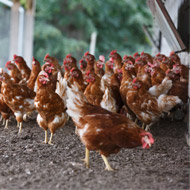EFSA tracks ‘most likely pathway’ for avian influenza

Experts conducted a thorough review of the information on avian influenza outbreaks in recent years. (stock photo)
New research by EFSA suggests the most likely pathway for avian influenza to enter the EU is through migratory wild birds crossing the north-eastern and eastern border.
Experts conducted a thorough review of the information on avian influenza outbreaks in recent years and reviewed surveillance approaches.
One of the main recommendations is that any water birds found dead should be reported to local veterinary authorities, particularly during autumn and winter, as this is peak season for influenza.
EFSA says it is also important to test farmed water birds, such as ducks and geese, for the virus, as they can easily come into contact with wild birds and spread the virus. This can be done by blood analysis of live poultry, and testing farmed water birds that are found dead.
Farmers and poultry keepers are also advised to adopt appropriate biosecurity measures. This includes preventing direct contact between wild water birds and poultry, using nets or by keeping poultry indoors during peak influenza season. Movement of animals between farms should also be avoided.
Arjan Stegeman, chair of the working group on avian influenza, said this research will “enhance the EU’s preparedness for avian influenza outbreaks”.



 The RCVS has announced a new version of its 1CPD mobile app, with enhanced features for veterinary surgeons and veterinary nurses to record their continuing professional development.
The RCVS has announced a new version of its 1CPD mobile app, with enhanced features for veterinary surgeons and veterinary nurses to record their continuing professional development.